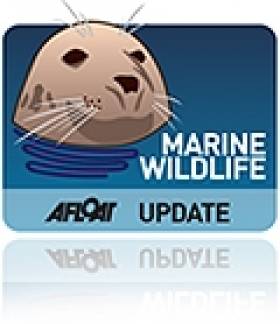Displaying items by tag: sea birds
'Very Rare' Sighting of Albatross in Irish Skies
#MARINE WILDLIFE - Staff and students from the Galway-Mayo Institute of Technology spotted an black-browed albatross in what was a "very rare" sighting of the bird in Ireland's skies, The Irish Times reports.
The group was on board the State marine research vessel Celtic Explorer off the southwest coast when they witnessed the albatross, also known as a Mollymawk, which is noted for its dark eye stripe.
The black-browed albatross is normally restricted to the Southern Hemisphere, but Birdwatch Ireland's Niall Hatch said it has been spotted from headlands in Ireland in the past.
As previously reported on Afloat.ie, the GMIT group were among a party of 20 scientists from Ireland, Nothern Ireland and Scotland carrying out a study of whales, dolphins, seabirds and plankton in the Atlantic.
Wildlife Groups Pledge Union With Oil Spill Response Plan
#MARINE WILDLIFE - The Evening Herald has highlighted the work of a new union of wildlife protection groups which is training volunteers to act the event of serious environmental threats to Ireland's sea bird population.
Wildlife rescue volunteer Pauline Beades from Garristown in north Co Dublin has been working with Ireland's animal groups to change the official approach to wildlife - particularly birds - that get caught in oil spills.
The Irish Seal Sanctuary, Birdwatch Ireland, the ISPCA, the Irish Whale and Dolphin Group (IWDG), Coastwatch and Irish Wildlife Trust have written a joint "letter of comfort" for the Irish Coast Guard, which is the State body charged with dealing with coastal oil spills.
The groups have pledged to work together in the event of any oil spill that involves a threat to marine wildlife.
Their response plan involves an initial wave of volunteers walking beaches to gather affected animals and providing first aid, followed by transfering them to veterinarians in specialised field hospitals, as well as facilities for longer-term care.
Recently Beades helped train volunteers in Limerick, who also attended lectures and demonstrations from visiting wildlife rescue experts from Europe to prepare for any potential sea-borne wildlife emergency.
Watch Brent Geese Return to Strangford Lough
Birdwatchers in Northern Ireland will want to be at the Mount Stewart lookout on 2 October for a special 'bird's eye view' of the return of thousands of Brent geese from colder climes.
The News Letter reports that the free event from 2-4pm at the entrance to Mount Stewart on Strangford Lough will provide an opportunity for the public to learn about the geese - arriving after epic journeys from as far away as the Canadian Arctic - and the work done by the National Trust to protect the waders and wildfowl that make Northern Ireland their home for the winter.
As much as 75 per cent of the world population of light-bellied Brent geese spend the winter months at Strangford Lough, which is recognised as a Ramsar site - a designation given to wetlands of international importance.
For more details on the special birdwatching event, contact Hugh Thurgate at +44 7900 678411.































































